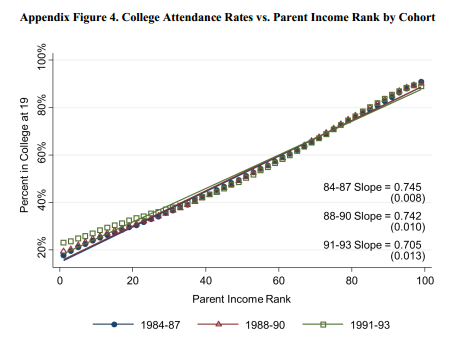Jennifer Pan has a piece Jacobin about the labor of social media. I enjoyed the bits about the extent to which social media jobs are essentially gendered emotional labor jobs in which predominately women interface with the public for a given company while the power structure that runs the company remains male-dominated.
I take exception however with this sentence:
As the ongoing debates over unpaid internships and writing for free have evinced, the traditional media world has long been structured to bar those who cannot afford the high cost of jumping through gatekeeping hoops from entry.
Indeed, this has become a common sentiment, but as I have expressed before, I think it puts way too much emphasis on cost as the relevant barrier that keeps those from poor backgrounds out of media jobs. The reality is that the vast majority of poor kids are locked out of media jobs well before unpaid internship considerations come up. Media jobs require college credentials that people from poor backgrounds rarely have:

It’s quite possible that the reason poor kids cannot get into media jobs is overdetermined. That is, if they managed to go to college and get the credentials, the cost of doing unpaid internships would still keep them out. But as it stands, removing that cost barrier will probably do very little to increase the number of poor kids going into media because the credential barrier will remain and filter them out just the same.
I bring this up because I think folks make a big error when they describe the costs of things like education and getting jobs as the most significant barrier to poor kids getting ahead in life. The actual most significant barrier is that growing up in poverty puts them extremely far behind those who did not grow up in poverty. Consequently, they get out-competed for the scarce number of seats at good colleges and the scarce number of jobs in media and so on.
Eliminating the costs associated with those things will not alter that competitive balance. Rich kids will still out-compete poor kids for things like writing internships at magazines because rich kids will, on average, be much more qualified than poor kids. Thus, lowering cost hoops by, for instance, making media internships paid wont meaningfully increase the accessibility of them to poor kids. Rich kids will still probably win them in a head-to-head competition with whatever small number of poor kids actually apply, only now the rich kids will get paid.
That’s not to say you shouldn’t pay for the internships. It’s just to say that doing so wont be a boon to poor kids, but more so to the rich kids who will still probably get them because of their other competitive advantages.